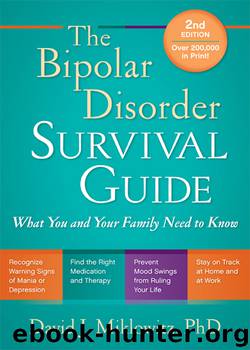The Bipolar Disorder Survival Guide by David J. Miklowitz

Author:David J. Miklowitz [Miklowitz, David J.]
Language: eng
Format: epub
ISBN: 978-1-60918-014-0
Publisher: Guilford Publications
Published: 2011-07-31T16:00:00+00:00
Maintaining Wellness Tip No. 3: Avoiding Alcohol and Recreational Drugs
Ruth, a 32-year-old woman who had just been diagnosed with bipolar I disorder, had a severe problem with drinking that usually began when she was relatively free of bipolar symptoms. Typically, romantic relationships with men or conflict-ridden business entanglements were the background of these episodes. Her drinking binges were so severe that she often had to be hospitalized and detoxified. She eventually was court ordered to undergo an Antabuse program, in which she was required to come in twice a week to take a medication that made her vomit if she drank.
Her own view was that her bipolar disorder was making her drink. Many observers, including her doctors and family members, felt that it was the other way around: that her drinking came first and led to her mood cycling. She constantly complained of the pain of the mood swings and their associated anxiety, but her symptoms co-occurred so consistently with drinking that it was difficult to tell which were due to the bipolar disorder and which to the alcohol. In fact, her family wasn’t even convinced she had bipolar disorder and thought it was one of many excuses she had given over the years.
During one interval, Ruth became convinced that she should give up alcohol and stayed abstinent for almost 6 months. Her mood swings were much improved during this interval: she still had a mild depression but no mania or mixed symptoms. She was able to obtain a regular waitressing job and began functioning better than she had in a long time.
During this period of recovery, however, Ruth came to the conclusion that she had no real problem with drinking. She began to reinterpret her past almost exclusively in terms of her new bipolar diagnosis, denying any causal influence of alcohol. For example, she labeled her past alcohol binges as “rapid cycling” and “self-medicating.” She reasoned that she wouldn’t again lose control of her drinking since her mood disorder had become stable.
About 5 months into her period of abstinence, she traveled to Palm Springs for a weekend with her new boyfriend. Quite deliberately, she discontinued her Antabuse program 5 days before the trip. Within 1 week she was back in the hospital in need of detoxification. Her depression was much more severe upon her hospital discharge, and she was court ordered, once again, into the Antabuse program.
Download
This site does not store any files on its server. We only index and link to content provided by other sites. Please contact the content providers to delete copyright contents if any and email us, we'll remove relevant links or contents immediately.
Cecilia; Or, Memoirs of an Heiress — Volume 1 by Fanny Burney(32558)
The Great Music City by Andrea Baker(32018)
Cecilia; Or, Memoirs of an Heiress — Volume 2 by Fanny Burney(31956)
Cecilia; Or, Memoirs of an Heiress — Volume 3 by Fanny Burney(31941)
We're Going to Need More Wine by Gabrielle Union(19046)
All the Missing Girls by Megan Miranda(16023)
Pimp by Iceberg Slim(14506)
For the Love of Europe by Rick Steves(14121)
Bombshells: Glamour Girls of a Lifetime by Sullivan Steve(14073)
Talking to Strangers by Malcolm Gladwell(13370)
Norse Mythology by Gaiman Neil(13363)
Fifty Shades Freed by E L James(13239)
Mindhunter: Inside the FBI's Elite Serial Crime Unit by John E. Douglas & Mark Olshaker(9339)
Crazy Rich Asians by Kevin Kwan(9291)
The Lost Art of Listening by Michael P. Nichols(7506)
Enlightenment Now: The Case for Reason, Science, Humanism, and Progress by Steven Pinker(7311)
The Four Agreements by Don Miguel Ruiz(6765)
Bad Blood by John Carreyrou(6621)
Weapons of Math Destruction by Cathy O'Neil(6279)
